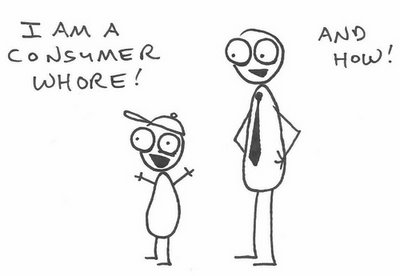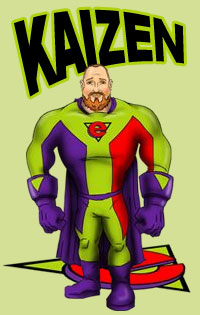The quote from Amanda Cooper's Entrepreneur Magazine article of November 2004 has been said ad nauseum in the hallowed halls of ePrize: "Some day, a company will come along and put us out of business, so it might as well be us."
Of course, some at ePrize are so full of themselves that they feel they are completely alone in their field; alone without competition. To that end they made up a fake company to motivate employees (as if the constant fear of firing and sweatshop mentality isn't enough).
Says CEO Josh Linkner in Leigh Buchanan's Inc magazine article of September 2006: I decided if a nemesis doesn't exist, let's create one. I made up a company called Slither. Slither is our head-to-head arch-evil enemy; its CEO is Gordon Gekko. They never have a down quarter. They have better clients and margins and employee retention than we do. They're more efficient and are growing faster.
Lame Wall Street reference aside (at least it wasn't Severus Snape), it wouldn't take a Slither to ePrize out of business -- that is, to shed the old skin of a promotions company (where "eSweeps are made Easy") where the latest innovation is a rehashed idea for the early days of the company (SweepsXpress) and branch out into new, cutting edge technologies.
In a company that touts ideas as being their most important asset, a sometimes a great notion gets tossed out on its ear in favor of sticking to the safer ground. Every time I see a commercial, promotional spot, print ad, or even supermarket standee that says "Enter for a chance to win... Text ______ to ______ and..." I think of one of the Project Managers at ePrize who tried to champion TXT/SMS/WAP as the next great frontier of interactive promotions.
He was poo-pooed for months. After he put together a terrific presentation of the presence of TXT in the U.S. (don't forget that TXT is far more popular in Europe where ePrize struggles to make a splash) and the potential of TXT in the industry... not a lot happened. There were and are a few odd promotions that tie into TXT but if there are more... I'm not seeing them.
Personally, I always felt that it was silly to outsource or utilize vendors for some of the simpler tasks that could be internalized. And, here again we could provide more services and more customized solutions to clients.
"The NEXTEL promotion generated over 2 million SMS messages generated in a 10-week period." Oddly, this fact was removed from "The ePrize Factor" page of ePrize.com
Who knows how many other ideas died on the vine or went unnoticed despite the alleged desire for feedback (see Project Gold Medal post). These are the ideas that could "put ePrize out of business." Undoubtedly, these are the kind of things that Slither can offer to its clients. After the first press release from the fictional Slither company, there were reactions like: "Who are these guys? I checked out their website and couldn't find it.". What Linkner may not realize is that he did too good of a job selling Slither. The report I got from several employees (most of them ex-employees now) was that they started looking for Slither's website to see if they were hiring!
I'm surprised that there wasn't a fake website with a fake "employment" section in order to entrap disgruntled employees. Knowing that putting one's resume on Monster.com is a "red flag" to an employee's loyalty, the lack of this refined shiftiness shocks me.

 Did you know that the first Matrix was designed to be a perfect human world? Where none suffered, where everyone would be happy. It was a disaster. No one would accept the program [...] I believe that, as a species, human beings define their reality through suffering and misery. -- Agent Smith (Hugo Weaving) from The Matrix.
Did you know that the first Matrix was designed to be a perfect human world? Where none suffered, where everyone would be happy. It was a disaster. No one would accept the program [...] I believe that, as a species, human beings define their reality through suffering and misery. -- Agent Smith (Hugo Weaving) from The Matrix.



 When I got back from lunch there was a smoke machine by my desk. I practically tripped over the bulky wires from the makeshift sound system and had to dodge the seven stands that were draped in green butcher paper.
When I got back from lunch there was a smoke machine by my desk. I practically tripped over the bulky wires from the makeshift sound system and had to dodge the seven stands that were draped in green butcher paper.  A buzz term that comes to mind is "managing expectations." There is little of that at ePrize. It's much more of a "promise the moon" mentality that keeps workers practically chained to their desk. The mantra there is, "This is not a nine to five job." At least there's truth in advertising here. When Godin describes those companies where employees jeopardize their health and marriages for the sake of work, he's talking about ePrize.
A buzz term that comes to mind is "managing expectations." There is little of that at ePrize. It's much more of a "promise the moon" mentality that keeps workers practically chained to their desk. The mantra there is, "This is not a nine to five job." At least there's truth in advertising here. When Godin describes those companies where employees jeopardize their health and marriages for the sake of work, he's talking about ePrize. 


